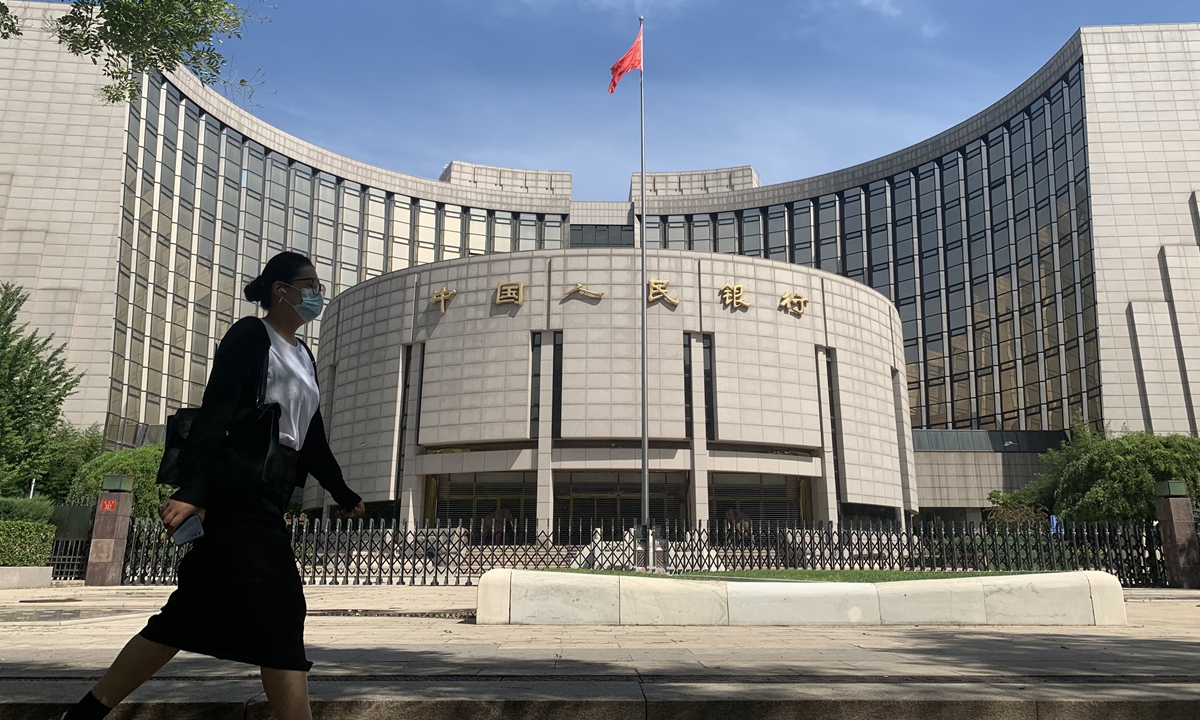Short-term yuan depreciation not necessarily a bad thing for China’s economic recovery: experts
Short-term depreciation not necessarily bad for Chinese economy: market observers

A view of the PBC building in Beijing Photo: VCG
The yuan has fluctuated recently in a reasonable two-way range despite facing downward pressure. Short-term depreciation is not necessarily a bad thing for China's recovery amid the languishing global economy, Chinese economists said on Thursday.
After breaching the psychological important mark of 7.00 per dollar on May 17 for the first time this year, the yuan further weakened and fell below the 7.10 level on Wednesday. The offshore yuan closed at 7.119 per dollar and the onshore yuan closed at 7.109 per dollar.
Throughout May, the yuan's spot exchange rate fell by about 2.5 percent.
Economists told the Global Times the yuan's weakening resulted from a stronger dollar amid Washington's debt ceiling showdown, as well as insufficient economic recovery momentum in China and foreign trade firms' weakened demand for foreign exchange settlements.
The global economy is under the shadow of the US debt ceiling showdown, following the US banking system crisis, Sun Lijian, director of the Financial Research Center at Fudan University in Shanghai, told the Global Times.
Such uncertainties pushed up global risk hedging demand, strengthening the dollar, much like the scenario when the US subprime crisis broke out in 2008, Sun said. The strong dollar has weighed on other currencies, including the yuan.
Dollar strengthening
The US Dollar Index soared to 104.53 -- a 10-week high, after the White House and the Republican-controlled House of Representatives reached an initial deal to raise the debt ceiling on Saturday.
Within China, the insufficient economic recovery momentum also puts pressure on the yuan, Yang Delong, chief economist at Shenzhen-based First Seafront Fund Management Co, told the Global Times on Thursday.
The official purchasing managers' index for China's manufacturing sector came in at 48.8 in May, down from 49.2 in April, remaining in contraction territory, data from the National Bureau of Statistics showed on Wednesday.
Yet, a short-term yuan depreciation is not necessarily a bad thing for China's economic recovery. As a manufacturing powerhouse, China could benefit from a weaker yuan in terms of boosting exports, Sun said, stressing that depreciation does not mean that economic fundamentals have deteriorated.
The strong resilience of China's economy persists, Sun noted, citing rosy exports in recent months and an improved export structure. Surging shipments of electric cars, lithium batteries and solar cells represent new driving forces of the economy.
Good for export
Along with efforts to foster domestic demand, it is crucial to maintain reasonable export growth under the "dual circulation" development paradigm, economists said.
It is normal for currencies to rise or fall, and the key point is whether a currency's performance could facilitate overall economic growth, experts said.
There is not much scope for the yuan to further depreciate, experts said.
The yuan still performed relatively robustly in comparison with other non-dollar currencies in May. It weakened 2.5 percent against the dollar, less than the euro (down about 2.7 percent) or the yen (down about 3.2 percent), according to media reports.
There is no basis for a continued depreciation of the yuan, and it will rise again above 7 per dollar, Yang said.
Not only is there no sign of capital flight, global investors have continued to bet on the Chinese market, Sun noted.
JPMorgan Chase kicked off its three-day JPMorgan Global China Summit in Shanghai on Wednesday. CEO Jamie Dimon made his first visit to China in four years and he said that the company "will be in China in both good and bad times," according to Bloomberg.
The summit attracted more than 2,600 participants from 37 countries and regions. Among them were some of the most influential investors in China and abroad, as well as representatives of companies whose market value totaled $4.5 trillion, including Starbucks and Pfizer.
Tesla founder and CEO Elon Musk concluded a 44-hour whirlwind visit to China on Thursday, stressing that the company objects to "decoupling" and is willing to further expand its capacity in China.
The capital market has seen a similar trend, with overseas money "buying at the bottom" and increasing their positions in China's A-share market since April, including funds managed by JPMorgan, Schroeder, Fidelity Fund and others, media reports said, partly due to the yuan's latest depreciation.
The breadth and depth of China's foreign exchange market has been expanding day by day, and it is self-balancing. The yuan's exchange rate also self-corrects, and can maintain basic stability at a reasonable and balanced level, according to a statement by the People's Bank of China (PBC), the country's central bank, on May 18.
The PBC and the State Administration of Foreign Exchange will enhance supervision, management, monitoring and analysis, strengthen guidance on market expectations, correct pro-cyclical and unilateral behavior when necessary, and curb speculation, the statement said.
It also vowed to improve hedging services for enterprises, reduce hedging costs for micro-sized, small and medium-sized enterprises, and better serve the country's real economy.

